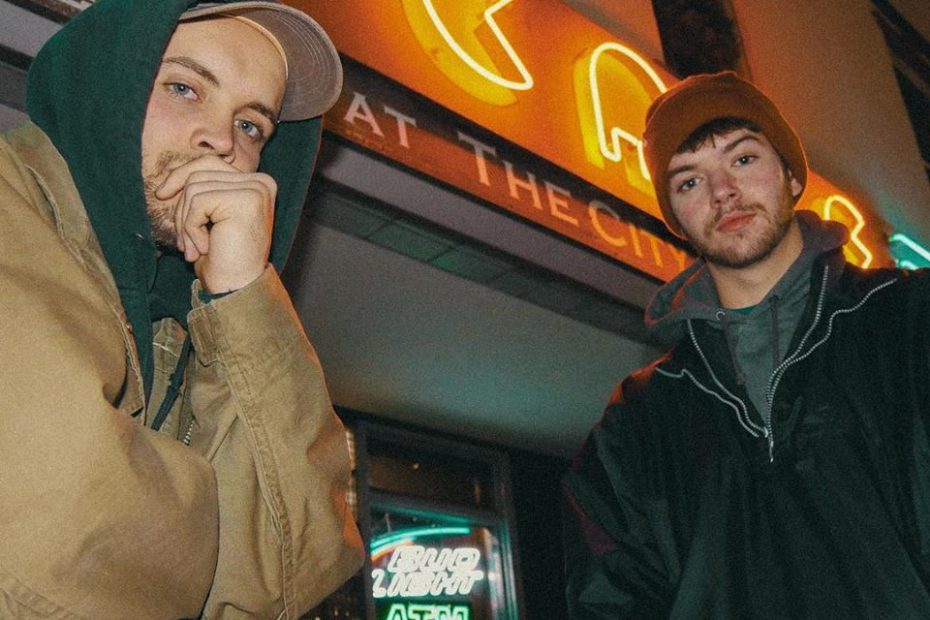This Write Up Wednesday features Go, an anthem for the modern and self-destructive idealist, written by The Hashassins, a Massachusetts rap duo consisting of Tim Barry (Sincere) and William Wallace Patten. Go is the final song in the track list of Not Sure, The Hashassins’ first album release of 2019 as well as their first album created together as a group. Both Barry and Wallace sling melancholic, smooth, and soft-spoken lyricism which, combined with their cadences reminiscent of slam poetry, helps develop a unique sort of somber mood mixed with cockiness throughout the project. Go concludes Not Sure’s repeated and contrasting theme of the urgency yet hesitancy to commit to a specific task in a more direct, autobiographical approach compared to previous tracks in the album.
Go begins with a slow, loungey piano solo, which also serves as the longest intro before vocals can be heard of any and all of the songs on Not Sure, appropriate for the finale track of the project. Barry’s melodic voice kicks off on the advent of the extremely satisfying sampled loop of the piano with a tone of regretful self-reflection, reminding himself of the lack of effort he’s making to improve the situation he’s been living in. Barry tells the listener his own perception of his life; it’s been on a steady decline but, instead of adapting positively and making an improvement to himself, he’ll lie about it to anyone he speaks to. The hook ends with eight bars of Barry repeatedly telling himself that he’s “gotta go”, which slowly evolves from a simple self-assurance into a pleaful command to change things before it’s too late.
Barry’s first verse takes place shortly after the artist has finally made the decision to “go”, and gives off an attitude that the act was impulsive and committed to in the spur of the moment. This mindset is further supported by Barry claiming that he tried to save up resources for the trip, but only brought his “weed and stuff”, and implying he left abruptly due to his girlfriend complaining that “he didn’t even say peace to us”. Barry defends his actions bluntly, stating that he needed a change of environment (specifically Los Angeles as his destination) and alcoholic consumption in a place that wasn’t the current space. However, he ends the verse by saying he is taking “steps forward but now I feel stuck in place”, which gives off the vibe that he is only escaping his problems to end up with the same consequences he is dealing with at the moment (implied to be heavily influenced by drinking).
William Wallace’s story comes in after the hook’s repeat and starts from before Barry’s personal act of “going” with Wallace planning out his journey in a more methodical and less spontaneous fashion. Contrasting Barry’s method, Wallace has made sure that he has enough funds for his trip and states that if he stays in his current location he’ll “end up where the trouble’s at”. This hints at the idea that Wallace is more responsible than Barry, and wishes to avoid conflict rather than spreading it somewhere else. Wallace mentions that his environment he’s living in consists of watching his friends suffer from addictions to various substances and other issues, which overall affects his mental state and gives him writer’s block due to the stress. The struggle of being stuck in a condition similar to Stockholm Syndrome with Wallace being worried about what to do about the debilitating actions of others while also taking a handicap to his own music allows Wallace to admit that fear is what’s preventing him from “going” to pursue his dreams. A sense of responsibility to help friends going through struggles similar to what Barry details in his verse is what’s holding Wallace back from living his best life, and the difference between him and Barry is that Wallace recognizes that. By the end of the verse, Wallace refuses to “throw in the towel” and shirk his positive influences he has on his friends and doesn’t “go” to fulfil his own goals, which is something he reflects on in the bridge before the final hook.
Both Barry and Wallace’s differing viewpoints on Go add perspective to what one may go through when they experience the common drive to “get up and go” to change their lifestyles. Personally, from the way I read into it, the hook of the track (which I traditionally view as a thesis statement to a song) seemed to resonate and relate more to what Barry laid out in his verse compared to Wallace’s, but that’s not necessarily a flaw as much as a stylistic choice. Go’s structure gave me the impression that Barry was the “protagonist” of the story the song wished to tell, and that Wallace was a supporting character watching his downfall through a paned window. However, the dynamism of The Hashassins’ ability to write songs with a nature of duality is what makes each song they create incredibly fascinating to analyze. While one artist’s character may be the focal point of the story being told, the accompanying artist always provides a separate interpretation that adds layers to the metaphysical narrative and ultimately showcases what a vocal duo can achieve that a solo artist could not.
